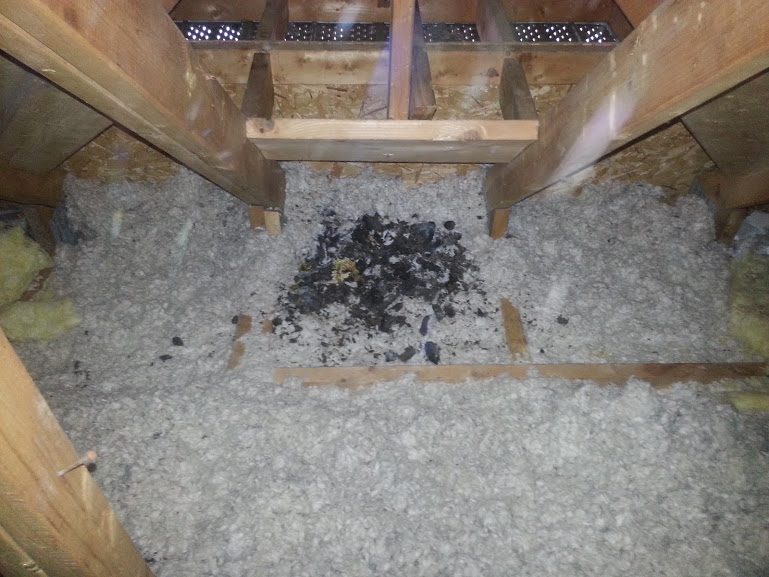Raccoons live in trees and build their nests in attics and basements throughout North America. They are one of the few animals species known to use human dwellings as a place to sleep, eat, reproduce, and raise young.
Most homeowners spend millions each year cleaning out raccoon droppings. But not all raccoons are bad neighbors. Some species make great pets.
And others are even beneficial pollinators. Raccoons are omnivores, meaning they eat everything, including insects, plants, fruit, birds, fish, rodents, reptiles, amphibians, and eggs. They aren’t picky eaters. However, they usually prefer fruits, vegetables, nuts, seeds, and meat over bones and shells.
What Does Raccoon Poop In Attic Mean?
When raccoons enter our homes their droppings end up in the attic. These droppings usually contain bacteria and parasites. There are times that this type of situation happens when raccoons come inside through a hole and dig around under the house looking for food and then leave some feces behind.
There is no way to eliminate the dangers of raccoons in attic from entering your home. However to minimize the risk of having raccoons live in your attic, remove any food sources from near your roof.
How raccoons get in your attic? Raccoons can easily get into your attic through a hole, a vent, or chimney. Raccoons are very good climbers and can easily find an entry point if one is available.
What Are The Health Risks Associated With Raccoon Poop?
Droppings have some pretty serious potential health hazards. When exposed to air, moisture and heat, bacteria multiply rapidly in the poo.
Bacteria in decomposing animal wastes pose various dangers. For instance, airborne pathogens such as Salmonella, Giardia and E. coli are found in many types of animal waste, including raccoon feces.
They can cause illness in pets and humans alike. Pet owners who handle their pet’s feces after finding them in their yard or house must wash their hands before touching anything else in either area.
Handling unrinsed dog and cat feces poses an infection risk for people touching or ingesting the feces.
Dog and cat feces also carry a variety of infectious diseases, including rabies and parvo virus, common in wild felines. Pets’ feces can spread the bacteria that causes giardiasis, and salmonellosis. To avoid exposure to hazardous microbes in animal waste, follow proper sanitation procedures.

How Can I Clean Up Raccoon Poop?
Try using a dehumidifier to keep your attic dry and free of moisture. To clear the odor, use hydrogen peroxide diluted 1 tablespoon per gallon of water. Spray it directly onto the smell. After spraying, wait 24 hours before ensuring the attic has dried out completely.
If you want to remove the actual poop, follow these steps:
Remove the insulation covering the entire area. This helps expose the mess underneath the insulation. Remove the layers of old shingles and debris. Then pull off the new layer of shingles.
Use a vacuum cleaner and brush attachment to collect the waste. Be careful to avoid getting any dust or hair attached to the bristles of the vacuum cleaner. Clean the entire attic floor. Use a cleaning solution made specifically for removing raccoon poo. Wipe over all surfaces and let it sit overnight.
How Can I Prevent Raccoons Permanently?
To remove raccoon feces, vacuum the space thoroughly. Then, scrub the walls, ceiling, floorboards, and other surfaces with bleach water solution or ammonia. Remove the vacuum bag and rinse it thoroughly under running water.
Dispose of the bag properly. Vacuuming the space helps to clear the air of contaminants and removes loose dirt and debris. Bleach or ammonia solutions kill microorganisms on contact.
While both can be used for cleaning, you won’t want to use ammonia indoors. Ammonia fumes can become very toxic.
Consider using a diluted mixture of 1/4 cup of bleach per gallon of water for indoor use. Use caution when working with chemical cleaners. Wear safety goggles and heavy-duty rubber gloves when applying chemicals and work inside a well-ventilated room.
Never mix household cleaners together. Be careful around pools of liquids, especially those made up of ammonia. Always read labels and follow directions carefully.
Final Words
In conclusion, if you live in an area where raccoons are common, you might have caught a pile of poop in the attic.
Raccoons will often defecate in attics around their nesting grounds. This could mean that they’re looking for somewhere warm to sleep during the winter months (or simply because it’s fun!), but when they find a place that’s safe and warm, they’ll use it—including using it as a nest!
Once they’ve used the spot, they’ll leave behind a mark that tells us a lot about them and their environment.
For example, if you notice a pile of droppings near an air vent in your home, this may indicate that rodents 101 are living under your roof. And if you see a raccoon scat near your fireplace, it could also point towards a problem with the chimney or flue.
The good news is that you don’t have to wait for the problem to worsen. A critter control Dallas expert can help identify your issue’s cause and ensure it doesn’t happen again.

